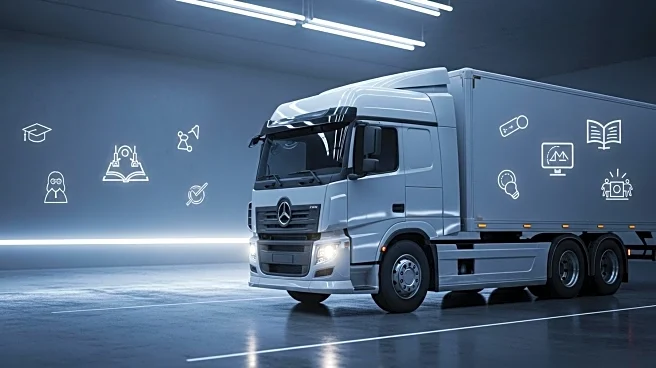What's Happening?
The trucking industry is facing a significant challenge in recruiting the next generation of drivers and technicians, as perceptions of the importance of a college education shift. According to a recent Gallup poll, the percentage of people who view a college education as 'very important' has dropped from 75% in 2010 to 35% today. This change is most pronounced among younger individuals aged 18-34, who are increasingly seeking alternatives to traditional career paths. The average age of new entrants into the trucking industry is in their late 30s, indicating that trucking jobs are often a third or fourth career choice. Despite the industry's efforts to recruit younger talent, traditional recruitment methods continue to dominate, leaving a gap in attracting younger individuals directly out of high school.
Why It's Important?
The shift in educational perceptions presents both a challenge and an opportunity for the trucking industry. As the current workforce ages and retires, the industry must find ways to attract younger individuals to fill the void. The decline in the perceived importance of a college education suggests that younger people are open to alternative career paths, which could include trucking. However, the industry's reliance on traditional recruitment methods may hinder its ability to capitalize on this opportunity. If the industry fails to adapt its recruitment strategies, it risks facing a shortage of drivers and technicians, which could impact logistics and supply chain operations across the U.S.
What's Next?
To address the recruitment challenge, the trucking industry may need to develop more targeted programs to attract younger individuals. This could involve partnerships with high schools and technical schools to create pathways into trucking careers. Additionally, companies might consider offering training and development programs that appeal to the interests and needs of younger generations. By proactively engaging with potential recruits early in their educational journey, the industry can build a pipeline of new talent ready to enter the workforce as older drivers retire.
Beyond the Headlines
The changing perceptions of education and career paths reflect broader societal shifts in values and priorities. As younger generations seek more meaningful and flexible career options, industries like trucking must adapt to meet these expectations. This may involve rethinking job roles, work environments, and career progression opportunities to align with the desires of a new workforce. The industry's ability to innovate and respond to these changes will be crucial in maintaining its operational capacity and competitiveness.











